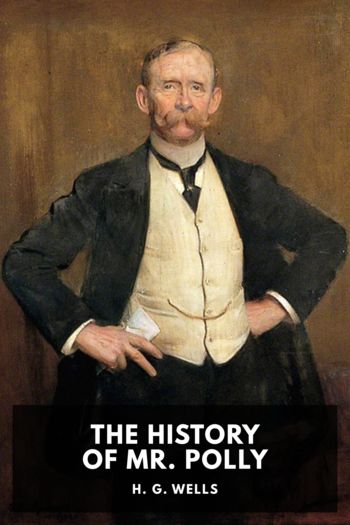Kipps by H. G. Wells (distant reading txt) 📕

- Author: H. G. Wells
Book online «Kipps by H. G. Wells (distant reading txt) 📕». Author H. G. Wells
One seeks excuses. Overnight there had been an encounter of Chitterlow and young Walshingham in his presence, that had certainly warped his standards. They had called within a few minutes of each other, and the two swayed by virile attentions to Old Methuselah Four Stars, had talked against each other, over and at the hospitable presence of Kipps. Walshingham had seemed to win at the beginning, but finally Chitterlow had made a magnificent display of vociferation and swept him out of existence. At the beginning Chitterlow had opened upon the great profits of playwrights and young Walshingham had capped him at once with a cynical, but impressive, display of knowledge of the High Finance. If Chitterlow boasted his thousands, young Walshingham boasted his hundreds of thousands, and was for a space left in sole possession of the stage, juggling with the wealth of nations. He was going on by way of Financial Politics to the Overman, before Chitterlow recovered from his first check, and came back to victory. “Talking of Women,” said Chitterlow, coming in abruptly upon some things not generally known, beyond Walshingham’s more immediate circle, about a recently departed empire-builder; “Talking of Women and the way they Get at a man—”
[Though as a matter of fact they had been talking of the Corruption of Society by Speculation.]
Upon this new topic Chitterlow was soon manifestly invincible. He knew so much, he had known so many. Young Walshingham did his best with epigrams and reservations, but even to Kipps it was evident that this was a book-learned depravity. One felt Walshingham had never known the inner realities of passion. But Chitterlow convinced and amazed. He had run away with girls, he had been run away with by girls, he had been in love with several at a time—“not counting Bessie”—he had loved and lost, he had loved and refrained, and he had loved and failed. He threw remarkable lights upon the moral state of America—in which country he had toured with great success. He set his talk to the tune of one of Mr. Kipling’s best known songs. He told an incident of simple, romantic passion, a delirious dream of love and beauty in a Saturday to Monday steamboat trip up the Hudson, and tagged his end with, “I learnt about women from ’er!” After that he adopted the refrain and then lapsed into the praises of Kipling. “Little Kipling,” said Chitterlow, with the familiarity of affection, “he knows,” and broke into quotation:
“I’ve taken my fun where I found it;
I’ve rogued and I’ve ranged in my time;
I’ve ’ad my picking of sweet’earts,
An’ four of the lot was Prime.”
(These things, I say, affect the moral standards of the best of us.)
“I’d have liked to have written that,” said Chitterlow. “That’s life, that is! But go and put it on the stage, put even a bit of the realities of life on the stage, and see what they’ll do to you! Only Kipling could venture on a job like that. That poem knocked me! I don’t say Kipling hasn’t knocked me before and since, but that was a fair knock out. And yet—you know—there’s one thing in it … this:
“I’ve taken my fun where I’ve found it,
And now I must pay for my fun,
For the more you ’ave known o’ the others,
The less will you settle to one—
“Well. In my case anyhow—I don’t know how much that proves, seeing I’m exceptional in so many things and there’s no good denying it—but so far as I’m concerned—I tell you two, but of course you needn’t let it go any farther—I’ve been perfectly faithful to Muriel ever since I married her—ever since. … Not once. Not even by accident have I ever said or done anything in the slightest—.” His little, brown eye became pensive after this flattering intimacy and the gorgeous draperies of his abundant voice fell into graver folds. “I learnt about women from ’er,” he said impressively.
“Yes,” said Walshingham, getting into the hinder spaces of that splendid pause, “a man must know about women. And the only sound way of learning is the experimental method.”
“If you want to know about the experimental method, my boy,” said Chitterlow, resuming. …
So they talked. Ex pede Herculem, as Coote, that cultivated polyglot, would have put it. And in the small hours Kipps went to bed, with his brain whirling with words and whiskey, and sat for an unconscionable time upon his bed edge, musing sadly upon the unmanly monogamy of soul that had cast its shadow upon his career, musing with his thoughts pointing around more and more certainly to the possibility of at least duplicity with Ann.
For some days he had been refraining with some insistence from going off to New Romney again. …
I do not know if this may count in palliation of his misconduct. Men, real Strong-Souled, Healthy Men, should be, I suppose, impervious to conversational atmospheres,





Comments (0)